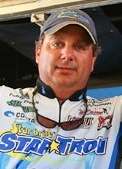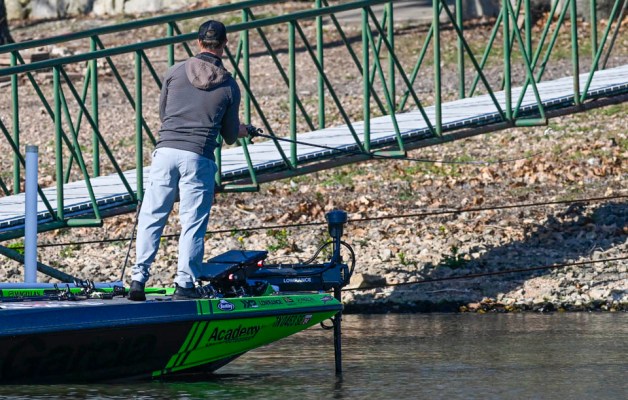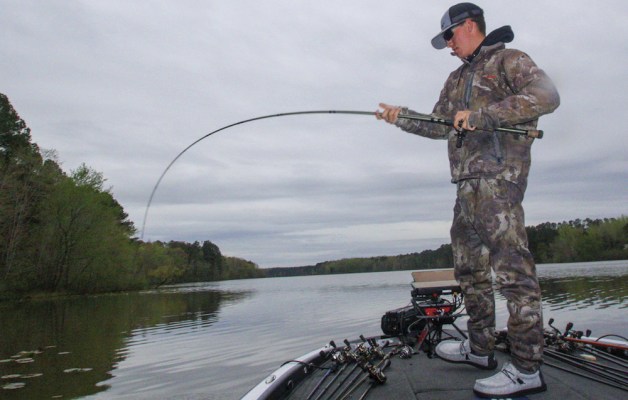Read part 1 of this story here.
When I was a kid, I was a Cub Scout just long enough to learn two things: (1) Don’t panic and (2) be prepared.
After 20-something years of tournament fishing, I think they’re the same thing. Preparation prevents panic. Last time we talked about controlling time and getting in “the zone” — that place where opportunity, preparation and execution meet.
The best example of preparation I know of is the story of the 1990 Classic on the James River. Rick Clunn had fished there in 1989 and found an area that offered the opportunity to win, but he didn’t have a bait to effectively fish it.
Prior to returning for the ’90 Classic, Rick went to a sponsor with an idea for a new bait — a very specific bait. It was a flat-sided crankbait with a tight action, a coffin bill that deflected off cover and it ran a little deeper than other squarebills.
Opportunity met preparation, and execution was certainly not an issue with Clunn on the deck. I still remember Bob Cobb’s TV coverage and the Bassmaster Magazine articles that followed. Over and over the story was told of Clunn’s intense focus throughout the event. He was in “the zone” and could not be stopped. Clunn was more prepared than any other angler in the field.
It’s not often we need a brand new production bait for our next tournament, but, there are some things we can do to be better prepared. Some are obvious, and you probably already do some of them. But sometimes, routines cause us to overlook our real purpose, and there may be some ideas here you’ve been overlooking.
Equipment preparation
We all sit outside the hotel the night before the tournament starts and spool up new line, fill oil tanks, charge batteries, count worms. But think about taking it a step further. Be organized. Not just in general, but organize specifically for the day ahead. Eliminate unnecessary rods, boxes, etc., from the boat and take a mental note of the location of the things you may need to find during competition.
I’ve added a really cool product called TackleWebs to my Triton this year. TackleWebs are handy storage nets that attach under your compartment lids. I’ll put spare packs of the specific plastics, hooks, jigs, or whatever that I think I’ll be using the following day into the TackleWebs. That way, there’s no time wasted looking for a box or sorting through a bag to find the right style, color or size. It’s right there — ready to go. They help eliminate wasted time during competition.
Plan for emergencies
Sooner or later it happens to everyone, despite the best preventative maintenance — a mechanical failure ruins a great day (or wastes valuable fishing time). Control everything you can. Spare props, trolling motor shear pins, fuses, relays, tool box, all should be on-board and ready if needed. How many of you know how to change a trim relay or a trolling motor on/off switch spring? Neither is hard, and each takes about three minutes if you have a spare and know what you’re doing. Spend some time with your mechanic and learn some of the easy fixes before problems occur.
Knowing you’re prepared to quickly deal with any distractions will build confidence, and confidence is key to slowing time.
Eat
Take time to eat during the tournament day. Find things that are quick and healthy — Things you can eat moving between spots or while you fish. Protein bars, bananas, apples, beef jerky. For peak performance, nutritionists tell us to refuel our bodies every hour or two. Without fuel, you’re body starts to shut down. Stress is amplified. You don’t think clearly. You get tired. Time speeds up.
Think
Every day on the water is different — a different puzzle with different pieces. You have to think both before and during the completion day. Decisions make the difference in tournaments. The fish are not always going to be where you found them in practice or biting the same baits that were good two days ago. Think ahead about where they are going or where they are coming from. What adjustments will you need to make for changing conditions? Keep thinking this way through the tournament day.
Prepare for success
From my experience, this is one of the most frequent mistakes made at the club/weekend level of our sport. Competitors are not prepared for success. A quick limit or an early big fish takes us by surprise. The opportunity to win is there, but knowing a good finish is assured causes us to take our foot off the gas. We get chatty, lose focus, spend too much time in unproductive areas. Somebody else wins. In a bass tournament, you can’t have too much weight or catch too many fish.
We can’t really slow time or add hours to our tournament days, but we can make the most of hours we have. Prepare, plan, eat, and think. The concepts are really pretty simple, but too often overlooked.
Read part 1 of this story here.





